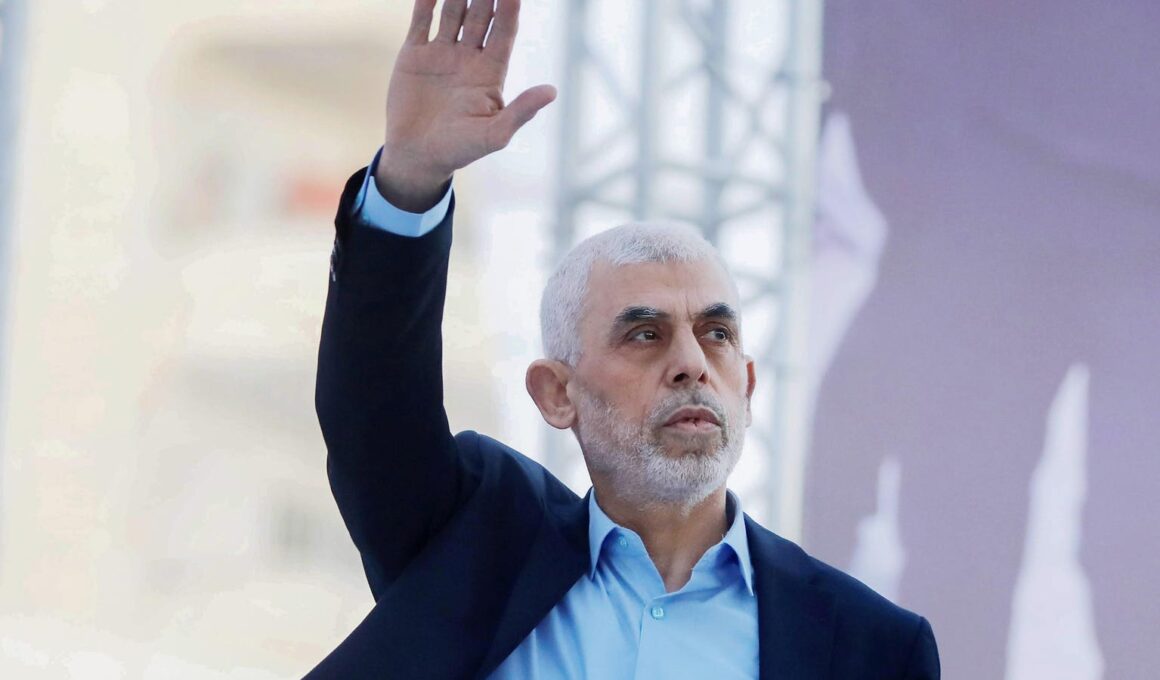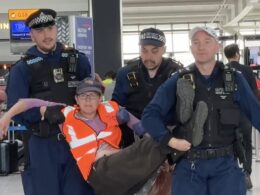Topline
Gaza-based militant group Hamas said Tuesday Yahya Sinwar will be the new head of its political bureau, one week after the assassination of Hamas’ political leader in Iran, though Israeli forces have named Sinwar—linked to the Oct. 7 attack on Israel—one of their biggest targets and called him a “dead man walking.”
Yahya Sinwar, head of Hamas, has been called a “dead man walking” by Israeli officials.
Key Facts
Hamas’ announcement comes seven days after Hamas’ top political leader, Ismail Haniyeh, was killed at a residence in Tehran, Iran, in an assassination Hamas blamed on Israel—though Israel hasn’t taken credit for the move.
Sinwar, who Israeli officials have called the mastermind of Hamas’ Oct. 7 attack on Israel, grew up in southern Gaza and joined Hamas—an Islamist group founded in 1987—in the late 1980s, gaining recognition as the founder of the group’s intelligence arm, the Munazzamat al Jihad w’al-Dawa, also known as the Majd.
In 1989, Sinwar was sentenced to four consecutive life sentences for abducting and murdering two Israeli soldiers, and served in an Israeli prison—reportedly learning Hebrew there—until his 2011 release, part of a massive prisoner swap in which Israeli officials freed more than 1,000 prisoners in exchange for Israeli soldier Gilad Shalit, who had been captured by Hamas.
Since his release from prison, Sinwar has been involved in multiple rounds of fighting against Israel, including an 11-day crisis in May 2021, when Hamas and the Palestinian Islamic Jihad launched rockets at Israel and Israel conducted airstrikes in Gaza.
In 2015, the U.S. State Department designated Sinwar a global terrorist, prohibiting U.S. citizens from engaging in transactions with Sinwar—he has also been sanctioned by the U.K. and France.
Sinwar, 61, was elected Hamas’ Gaza leader in 2017 in a secret election, offering a public platform of “peaceful, popular resistance” despite a reputation as a hardliner, and was reelected to a second four-year term in 2021, months before another round of Hamas rocket attacks on Israel.
Sinwar has also gained prominence as a critic of Mahmoud Abbas, the head of the Palestinian Authority and its ruling Fatah party—a rival to Hamas that controls the West Bank but not Gaza—with Sinwar vowing in a 2022 rally to “give the chance to ignite the resistance in the West Bank.”
Sinwar vowed in that speech to come for Israel “God willing, in a roaring flood” and “with endless rockets” and “millions of our people, like the repeating tide,” according to a translation by Reuters.
While Israeli officials have cited Sinwar as the force behind Hamas’ Oct. 7 attack, Harel Chorev, a senior researcher of Middle Eastern studies at Tel Aviv University, told CNN late last year Sinwar was one of a “triumvirate” of senior Hamas officials who planned the attack on Israel.
Chorev also told CNN Sinwar is “perceived as the most senior” Hamas official, though Chorev said Sinwar is only one of several “power centers” within Hamas, which Chorev said maintains a “decentralized” organizational structure, with some senior leaders living in Qatar.
Sinwar has in the past publicly expressed caution over warring with Israel, telling Italian journalist Francesca Borri in 2018 a “new war is in no one’s interest,” adding Hamas would be open to negotiating with Israel in exchange for Israel and Egypt lifting their blockade of Gaza (that blockade has been in place since Hamas took control of Gaza in 2007).
Key Background
War broke out in the Gaza Strip in the wake of Hamas’ Oct. 7 attack on southern Israel, which left roughly 1,200 people killed, according to Israeli estimates (the Hamas-led Gaza Health Ministry estimates over 39,000 people have died since Oct. 7 in Gaza, though that count does not distinguish between civilians and militants). After a string of temporary cease-fires just over a month into the war, fighting resumed in the Gaza Strip in December, re-sparking international calls for a ceasefire. In recent months, the fighting has centered around southern Gaza, after Israel’s initial invasion focused on Gaza City in the enclave’s north.
Tangent
The Israel Defense Forces said late last year they were closing in on Sinwar’s home, while U.S. officials have said his “days are numbered.” In December, Israeli Prime Minister Benjamin Netanyahu said in a tweet the IDF had surrounded Sinwar’s house in Khan Younis, though the move is believed to be largely symbolic, as the Hamas leader is believed to be hiding deep underground in Hamas’ extensive labyrinth of tunnels. In his tweet, Netanyahu acknowledged Sinwar’s house “is not his castle, and he can flee, but it is only a matter of time until we find him.” Israeli officials said at the time the IDF has killed roughly half of Hamas’ mid-level commanders in Gaza, and just last week, the IDF said it had killed Mohammed Deif, the head of Hamas’ al-Qassam Brigades, in a July airstrike in Gaza.
Further Reading
Israel And Hamas Reach Hostage Release Deal In Exchange For 4-Day Pause In Fighting (Forbes)
“>








